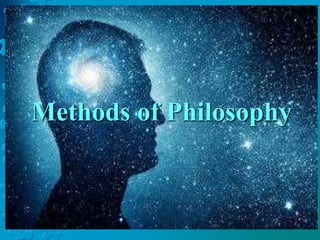
Methods of Philosophy Explained
- 2. Philosophy brings the human person to a level of thinking and/or expression that develops wisdom and further learning. When you failed, for the first time, you then realized what made you fail; and so, the next time you are faced with a similar situation, you already know better how to approach it in order to succeed.
- 3. And when you reach that stage of philosophy, you are building up on wisdom. Wisdom is the application of knowledge.
- 4. • There are four different methods of philosophizing • logic, • existentialism, • analytic tradition, and • phenomenology.
- 5. • Logic in simple words, is the art and science of correct thinking. “The study of truths based completely on the meanings of the terms they contain.”
- 6. ⚫ The foundation of a logical argument is its proposition, or statement. ⚫ The proposition is either accurate (true) or not accurate (false). ⚫ Premises are the propositions used to build the argument. ⚫ The argument is then built on premises. ⚫ Then an inference is made from the premises. ⚫ Finally, a conclusion is drawn.
- 7. Existentialism • is a philosophical view that assert the individuality of any human person making him free to make choices of what he is and what he can become.
- 8. • This means that you students are unique and would most likely have a future that is true to your own person and not what is being dictated by your parent nor your friends. • At what Jean-Paul Sartre says, “Freedom is the identity of man.”
- 11. • Existentialism teaches one enjoy freedom but with due responsibility on what is wrong and is right. • Through this method, you can discover more sets of truth without any limitations. As a man who has freedom you must put to mind that you are accountable of your choices and decision in life.
- 12. Analytic Philosophy • states that, “assumption of truth only becomes true after it shall have gone through validation, experimentation or any scientific approach for that matter.
- 13. • In school setting for example, there are questions teachers ask that may elicit different responses, but there is only one definite correct answer and this answer is usually supported by a concept or a theory which is a product of scientific process.
- 14. • Analytic Philosophy teaches you that it’s not how you see things and how you perceive them, but how they are processed through rigorous and valid methods. • Hence, exact truth is seen in the lens of due scientific process. • In life, you must remember that truth is accompanied with process.
- 15. Phenomenology • brings varied perceptions over a thing to a common end that certain things no matter how different the perspective of people towards it due to their experiences would receive justification to its being.
- 16. • For example, in this image you may look at it as half full, some look at it as half empty. This thing may appear in different perspectives. • In applying phenomenology, one must go back to its original meaning or “thing-init- self” (according to Encyclopedia) that is simply a glass of water.
- 17. • Things may appear to you in different ways. Yet, what is important is to see its essence. • This phenomenological way brings you to the essence of anything. • Hence, also see the importance of the things that you encounter for there is always essential meaning why things exist.
- 18. • For you to make use of logic a tool in understanding complex proposition presented in statements or texts, you may use two types of reasoning: • DEDUCTIVE • INDUCTIVE
- 19. Deductive Reasoning • There are usually complex thoughts we encounter, and it takes a hard time to understand what is expressed in it. • But with the help of deductive reasoning we can chunk the entire thought into smaller units to arrive at a simpler presentation.
- 20. • Examples • Premises: All Teachers are smart people. Some smart people are studious. Conclusion: Some smart people are teachers. • Premises: All students are kind. Pedro is a student. • Conclusion: Pedro is kind.
- 21. Inductive Logic • there are presentations of statements or ideas wherein its specific details come first before generalizations are being laid. • In this case, use bottom up approach in trying to understand the concept. "bottom up," meaning that it takes specific information and makes a broad generalization that is considered probable, allowing for the fact that the conclusion may not be accurate.
- 22. • Premises: Peru is a drunkard. Lucky is one of the brothers of Peru. • Conclusion: In this case, you could use inductive reasoning to offer an opinion that it was probably Lucky, and his other brothers are also drunkard. • Explanation: The probability of your assumption may not necessarily be true for lucky and his other brothers might have different priority in terms of drinking liquor.
- 23. • Premises: Going to public places increases high possibility to acquire COVID19. Rose goes to the market every day. • Conclusion: Therefore, Rose is COVID-19 infected. • Explanation: The probability of your assumption may not necessarily be true for Rose might follow the proper protocol.
- 25. • Logic allows you to think accordingly about anything, making your reasoning correct, and removing any possible bias that influence your judgement. • Through this method of philosophizing you will be critically capable of weighing what is probable and what is true. • When applied to life, this will allow good consequences and benefits.